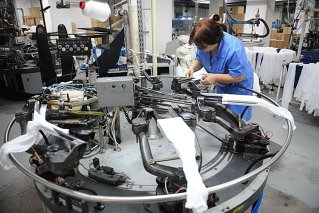www.zfenglish.com - Last update 21:05
Adesgo's Story: How An 85-Year Old Plant Produces Under Cacharel And Victoria Street Brands
10.04.2011
With an 85-year history, 370 employees and a plant in downtown Bucharest, hosiery producer Adesgo is battling with foreign brands such as Gatta or Golden Point.
The company's main rival, Mondex, is under insolvency, and the other Romanian companies on this market operate on the low-price segment and are not direct rivals. The main plus of the company? Its strong brand, say Adesgo representatives.
"Domestically, Romanian producers went to the low-price market, and we are not battling them. We are positioned on the mid and mid-up segment and we're fighting Italian and Polish companies," says Shlomo Binder, sales and marketing manager with Adesgo, which sells its products on the Romanian market under Diamond brand.
The company has had many owners, of various nationalities, but it still produces hosiery, just like 85 years ago. Meanwhile, Adesgo has started producing underwear. The production process is not much different from that of over 8 decades ago.
Binder says that the company has recently moved from Israel to Romania production equipment worth EUR1 million. Now, the Bucharest plant is the only production facility of Israeli-held Argaman Industry group, which took over the majority stake in Adesgo in 2002. By late 2003, Adesgo had doubled output and turnover as it attracted new foreign clients.
The company has recently invested EUR25,000 in a store on Magheru boulevard of Bucharest. The first such store was opened last year, at the entranceway in the plant's headquarters. Only two months since opening, the unit of Magheru reached half the sales of the first Adesgo store.
Now, Binder says he's seeking another four spaces in Bucharest. He explains the company does not go into malls as costs are high. However, he does not rule out opening in such locations, but with more expensive products, which should cover rents. For the time being though, he's looking for street front locations in Bucharest and will then go to major cities such as Iasi, Sibiu and Constanta.
Adesgo products are also present in the stores of all modern retail networks, expect Billa and Mega Image. He says the main advantage of the company is that it is known even without it relying on advertising. In terms of minuses, he recalls that one cannot speak of client loyalty on the hosiery market.
The company has bet on exports, with over 80% of production going abroad. However, the domestic market is more profitable, according to Binder. The company's international clients include Cacharel (France), Falke (Germany), Hema (the Netherlands), Tesco (UK) and La Senza (Canada). Victoria Street was also Adesgo's client, but the contract has not been renewed.
Products destined to foreign markets carry the client's brand and the "made in Romania" label. Binder says, though, that everything is decided at the level of the Bucharest plant: the packaging, colors and models.
The raw material for Adesgo products comes from Israel and Turkey, but the packaging comes from Romania. Both production and packaging are operated in Romania, but not necessarily at the Bucharest plant. "We have 3-4 subcontractors from Giurgiu, Buzau and Ploiesti," says Binder.
After a period of ongoing growth in the 2002-2008 period, Adesgo felt the crisis fallout in 2009, when sales slid by around 30%. In 2010, the company's turnover revolved around 50 million lei (EUR12 million), down around EUR1 million from 2009, but Adesgo returned to profit of RON0.9 million (around EUR0.2 million). In the first half of 2011, Adesgo reached sales of RON24.3 million and for the second half targets higher sales on the opening of the new store and the launch of new products.
"In 2011, we are recouping losses. It is a good year both for exports and for the domestic market".
(English version by Catalina Apostoiu)

